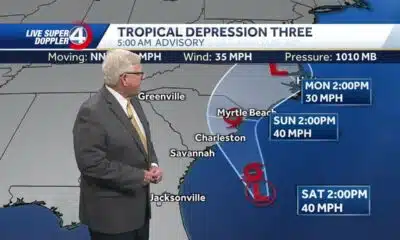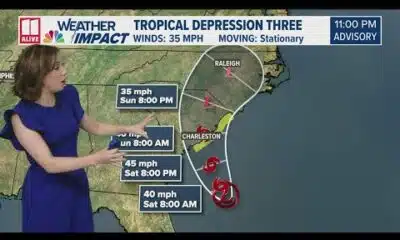News from the South - North Carolina News Feed
Bills from NC lawmakers target DEI, immigration and social media
What we’re (also) watching: More eye-opening bills from NC lawmakers
RALEIGH — The pace continues to quicken in the state capital, where lawmakers have filed hundreds of bills in advance of looming deadlines.
Here’s a few that caught our eye.
Investing in crypto
North Carolina may soon join the cryptocurrency crowd.
House Speaker Destin Hall is pushing House Bill 92, which would allow the state treasurer to invest up to 10% of state funds — including pensions — in digital assets like cryptocurrencies and non-fungible tokens (better known as NFTs).
In the past six months, a majority of states have presented similar bills across party lines.
Hall, a Republican representing Watauga and Caldwell counties, told a legislative committee Wednesday that the state’s pension fund is “handcuffed” without the ability to diversify in digital assets like Bitcoin.
“Cryptocurrency is sort of an emerging issue in finance across the world,” Hall said. “We’re not plowing any new ground really in this bill; it’s new for North Carolina, but it’s not new across the world.”
Republican State Treasurer Brad Briner signaled his support for the bill in a memo to lawmakers. Briner previously worked for former New York City mayor and billionaire Michael Bloomberg, a fact Hall cited as a reason to trust his judgment.
Some, including state Rep. Bryan Cohn, were wary. Cryptocurrencies aren’t backed up by physical assets or government promises. Cohn said that may make cryptocurrencies prone to price manipulation and volatility. He worries of a potential future crash.
“I think it warrants caution,” said Cohn, a Democrat.
Hall pushed back against Cohn’s request for a study on cryptocurrency investment, and the bill won majority support in its first committee.
The House Pensions and Retirement Committee plans to hear the bill at its March 12 meeting. If it gets a favorable reaction, the measure will move to the full House chamber.
Limiting social media access for minors
While TikTok narrowly escaped a national ban — for now — lawmakers in Washington, and now North Carolina, aren’t pumping the brakes on social media regulation for minors.
A month after U.S. Sen. Ted Cruz, R-Texas, reintroduced The Kids Off Social Media Act in Congress, North Carolina Rep. Jeff Zenger, R-Forsyth, filed his own bill setting social media limits for minors.
House Bill 301 would ban social media access for kids under 14 and require social media platforms to get parental consent before allowing 14- and 15-year-olds to create accounts.
Pre-existing accounts would be deleted. Social media platforms would also be required to delete all personal information gathered about these minor account holders.
Furthermore, the bill would mandate websites or applications that host a substantial portion of content considered “harmful to minors” use age verification methods to ensure users are 16 or older.
Age-verification laws have previously blocked access to sites altogether, as evidenced by Pornhub kicking users out in states like North Carolina that have passed such laws.
House Bill 301 was referred to a House Judiciary Committee, but is not yet scheduled for testimony.
Border protection bills
First, there was House Bill 10, passed late last year, which required sheriffs to cooperate with federal immigration officials.
Now, there’s Senate Bill 153 — the North Carolina Border Protection Act. The measure is similar to HB 10, but with statewide law enforcement agencies, alongside other measures, cracking down on illegal immigration.
Republican Senate leader Phil Berger of Rockingham County stamped his name on the latest immigration legislation as lead sponsor.
“It is evident there is a need for change when it comes to sanctuary policies in North Carolina,” said Berger before the Senate passed the bill along party lines. “The legislature is stepping up to ensure our citizens and communities are safe, but unfortunately Democrats are refusing to address the very real threat illegal immigration poses to our state.”
The bill would require officers of the Department of Public Safety, Department of Adult Corrections, State Highway Patrol and State Bureau of Investigation to determine if anyone in their custody or under their supervision was an undocumented immigrant. If so, they would be responsible for sharing that information with U.S. Immigration and Customs Enforcement, better known as ICE.
Under the proposed legislation, the state budget office would also have to audit public benefits programs to determine whether any undocumented immigrants had access to services like Medicaid, rental assistance or food stamps.
Additionally, Berger’s bill bans University of North Carolina-affiliated universities from acting as sanctuaries for undocumented immigrants. Those institutions may not maintain policies that limit enforcement of federal immigration laws, such as ones that would prevent law enforcement from gathering information on the citizenship status of students.
Finally, it allows counties and cities that have sanctuary policies to be sued if an undocumented immigrant commits a crime there.
Sammy Salkin, a policy analyst for the American Civil Liberties Union, testified before lawmakers that the bill was an “attack on immigrant communities” that attempted to “further the false narrative that immigrants are a drain on our public service system and pose a threat to public safety.”
In fact, undocumented immigrants living in North Carolina contribute to state and local tax revenue while already barred from receiving public benefits, Salkin said.
“This bill is not about protecting our communities,” she said. “It’s about furthering an anti-immigrant agenda, no matter the costs.”
Senate Bill 153 is now in the House, where it will likely be assigned a committee.
Other bills address immigration, too. House Bill 261, for instance, would enhance prison sentences for North Carolina residents who commit felonies and are also undocumented.
Dismantling DEI
Republicans in both chambers are targeting diversity, equity and inclusion efforts — but with different bills. While a House bill is looking to ban DEI within state agencies, a Senate bill aims to eliminate it in public education.
Under Senate Bill 227, public school educators could not promote a series of “divisive concepts” in the classroom. Among them:
- One race or sex is inherently superior to another race or sex.
- An individual, solely by virtue of his or her race or sex, is inherently racist, sexist or oppressive.
- An individual, solely by virtue of his or her race or sex, bears responsibility for actions committed in the past by other members of the same race or sex.
Discriminatory practices, such as treating people differently or excluding someone from participation in an educational activity based on race, sex or other demographic factors, would also be banned.
Bill sponsor Sen. Michael Lee, R-New Hanover, said the bill is not a ban on teaching history, free speech, individual research or discussions on diversity, equity or inclusion. In fact, Lee thinks the goals of DEI are “laudable,” he told a Senate Education Committee on Wednesday.
But he believes the DEI effort has backfired.
“Unfortunately, a lot of these policies haven’t really opened doors for people to compete fairly, but have forced artificial outcomes at the expense of fairness and competency,” Lee said. “And many times, it did it for the very students the policies were trying to help.”
Democrats were concerned about implementation. One question they raised: Who decides what counts as promoting a divisive concept?
ACLU Policy Director Liz Barber said the bill may be unconstitutionally vague, since teachers would have to understand what they can and cannot say to follow the rules.
House Bill 171 hasn’t gotten quite as far yet. It would bar state agencies from maintaining DEI programs or policies, or implementing DEI training.
Agencies could not use taxpayer funds for DEI purposes, and could not accept federal money or grants that require compliance with inclusion mandates. Existing programs funded this way would be ended.
The bill has been referred to the House Judiciary committee, but is not on the calendar yet.
Red, white and true bills
North Carolina Republicans want fireworks this session — literally.
In the House, there’s the Patriotism Expression Act.
In the Senate, there’s Celebrate America’s 250th — Let Freedom Ring!
Both bills would allow state residents to buy fireworks at age 18. But that’s just the beginning.
House Bill 186 — the Stars and Stripes Commitment Act — requires public and charter schools to broadcast the Pledge of Allegiance every day as well as display U.S. and North Carolina flags in classrooms. However, no individual would be required to participate by standing, saluting or reciting the pledge. Senate Bill 123 would do the same, but with money to purchase the flags.
Other bills also deal with flags. House Bill 227 would mandate that state institutions only buy American and North Carolina flags that were entirely manufactured in the United States.
House Bill 244, the Depoliticize Government Property Act, would allow only specific flags to be flown on state property, like the American flag, the state flag and military flags. The list does not include rainbow flags, often used to show support for the LGBTQ+ community, or any other non-governmental flag.
This article first appeared on Carolina Public Press and is republished here under a Creative Commons license.
The post Bills from NC lawmakers target DEI, immigration and social media appeared first on carolinapublicpress.org
News from the South - North Carolina News Feed
Red flags when you're buying or selling a used car
SUMMARY: Buying or selling a used car this summer requires caution due to prevalent scams. July is peak season for used car transactions, attracting scammers targeting both buyers and sellers. John Matarice highlights how easy it is to fall for fake check scams, like Matt Nef, who tried selling a 1948 Packard and received a counterfeit check exceeding his asking price, with requests to send money to a shipping company. Similarly, buyer Dejon Wallace nearly lost $1,200 on a fake check from a seller on Facebook Marketplace. To avoid fraud, always meet in person, never cash checks and send money back, and avoid wiring funds to strangers.
July is typically peak season for buying and selling used cars. Anyone in the market for one or trying to sell their own should be wary of scams.
News from the South - North Carolina News Feed
What to expect traveling for July 4: roads, weather, air travel
SUMMARY: Many Americans are traveling extensively this July 4th, with airports and roads packed for the holiday weekend. However, severe weather is causing significant disruptions. In Texas, heavy rainfall triggered flash floods near Kerrville, leading to evacuations and multiple deaths. The Northeast also faces storms, resulting in over 100,000 power outages across New York, Pennsylvania, New Jersey, and Massachusetts. New Jersey reported at least three storm-related deaths. Despite weather challenges, air travel is expected to hit a record with nearly 6 million domestic passengers, while over 61 million are predicted to travel by car. Gas prices are at their lowest July 4th average since 2021.
While the airports and roads have been packed, severe weather has also been causing major problems. ABC’s Olivia Rubin has more.
More:
Download: https://abc11.com/apps/
Like us on Facebook: https://www.facebook.com/ABC11/
Instagram: https://www.instagram.com/abc11_wtvd/
Threads: https://www.threads.net/@abc11_wtvd
TIKTOK: https://www.tiktok.com/@abc11_eyewitnessnews
News from the South - North Carolina News Feed
A July 4th “must read”: The Declaration of Independence
SUMMARY: On July 4, 1776, thirteen American colonies declared independence from British rule, citing King George III’s repeated abuses and denial of rights. The Declaration of Independence asserts that all men are created equal, endowed with unalienable rights to life, liberty, and the pursuit of happiness. Governments derive legitimacy from the consent of the governed and must be altered or abolished if destructive to these rights. After numerous grievances—such as unlawful laws, taxation without consent, military oppression, and judicial manipulation—the colonies declared themselves free and independent states, pledging mutual support for their new nation’s liberty and security.
The post A July 4th “must read”: The Declaration of Independence appeared first on ncnewsline.com
-
The Center Square6 days ago
U.S. Senate prepares for passage of One Big Beautiful Bill Act | National
-
News from the South - Louisiana News Feed6 days ago
Water company hiked sewage rates in Lafayette to state’s highest
-
News from the South - Tennessee News Feed6 days ago
“Choose how you love:” Nashville Pride 2025
-
Mississippi Today5 days ago
Feds unfreeze $137 million in Mississippi education money
-
News from the South - Virginia News Feed7 days ago
Senate Republicans work through the weekend to pass Trump’s One Big Beautiful Bill
-
News from the South - Arkansas News Feed6 days ago
Thousands celebrate pride, progress at the 2025 NWA Pride Parade
-
News from the South - Arkansas News Feed6 days ago
Congress unlikely to enact ‘absolutely devastating’ Trump proposal to slash Pell Grants
-
Local News6 days ago
Mississippi airports working to complete projects







































